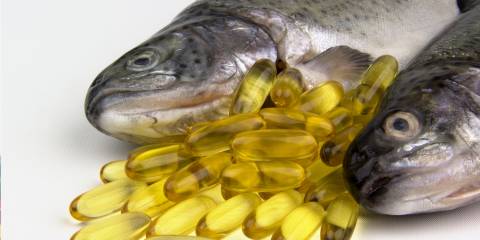A couple of servings a week can boost your brain and your heart and provide a huge range of other benefits.
Fish are the best dietary source of two crucial omega-3 fatty acids: eicosapentaenoic acid (EPA) and docosapentaenoic acid (DHA). All fish contain these omega 3s, but oily, coldwater species like salmon, sardines, and herring are the richest sources. Some forms of marine algae are another source—look for it in supplement form. Among their many attributes is that EPA and DHA reduce triglycerides, a type of fat in the blood. Certain plant foods, such as walnuts and flaxseed, provide alpha linolenic acid (ALA), another omega 3 that the body partially converts to EPA and DHA.
Thousands of studies have found health benefits from consuming omega 3s, including
- Lower risks for heart disease, dementia, brain aging, Type 2 diabetes, certain cancers, rheumatoid arthritis, and osteoarthritis.
- Enhancements in memory and thinking abilities, immune function, strength training, eye health, and lung function during exercise.
Eating baked or broiled fish is more healthful than eating it fried. In fact, eating fried fish not only cancels the benefits, but it may also increase the risk of heart disease.
The American Heart Association (AHA) recommends that adults eat fish at least twice a week, although it has not set a dietary guideline for daily omega 3 intake. The AHA recommends supplementation with fish oil for adults with heart disease or high cholesterol.
The American Dietetic Association and the Dietitians of Canada have jointly recommended a daily intake of 0.5 grams of combined EPA and DHA for most adults. You’ll get about a gram from each serving of fatty fish.




